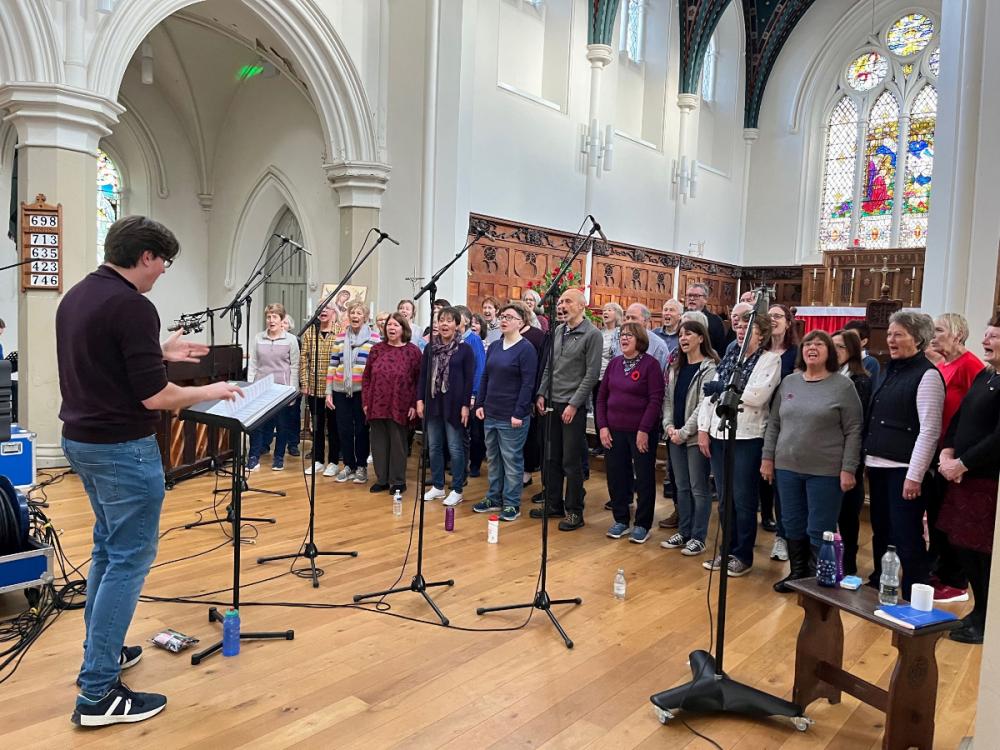Back in November I had the privilege of playing piano for David Weale’s ‘The Skipton Choir’. They had a recording day at Christchurch that lasted the whole day – an opportunity to put down ten of their favourite songs for posterity. I had an absolutely lovely day, culminating in a meal at Calico Jack’s where I was able to get to know some of the choir members better.

This month the recordings have been released on all popular streaming platforms, and I’m pleased to be able to post the Spotify embed below so that you can listen to the results from this page:
Not only was it lovely to meet new musicians and be part of a very special day for this local singing group, but in preparation for the recording I was reminded of some valuable practise techniques that apply equally whether you’re rehearsing for a big concert or simply trying to improve your playing for your own pleasure:
- Concentrate on one thing at a time.
- Because I had the accompaniment parts of ten songs to learn, most of which involved some technical challenge or other, it could easily have seemed like an overwhelming task to get them all right. But, I tried to learn the songs in rotation – working on just one or two of them each day.
- Start with the difficult passages.
- The temptation to play from the beginning to the end of a piece is really powerful, especially when one is trying to convince oneself that ‘it’ll be alright!’ But, there’s always a tricky bar or two that often cause the music to falter, if not because of bum notes then at least due to hesitation or other thinking gaps appearing. So, as I started working on these songs I always began my practise with those difficult passages that could potentially cause me a headache. Sometimes I didn’t even play the rest of the song – I just worked on two or three bars for the entire practise session. This level of focus really pays off because it means that in the throws of the performance you’re not concerned as you approach those more challenging parts of the song.
- Don’t rush.
- Anxiety causes the bodily processes to accelerate. So, when there are challenging passages to get through, we can inadvertently go into ‘fight or flight’ mode, and the upshot of this for musicians is speeding up. Try to step back, remain aware of the musical tempo and resist the temptation to push forward with the speed.
- Be patient
- As the old saying goes, Rome wasn’t built in a day. I spent weeks practising the piano parts for these recordings, and bit by bit I got more confident about them. The most common concern I hear from my students is that they think they should be ‘better by now’. But, musical performance is difficult – it takes lots of time to master even relatively straightforward pieces. So, instead of trying to walk before you can run, take your time and enjoy the slow, steady process of learning. And, use a metronome!
- Piano accompaniments don’t have to be played exactly as written
- With the best will in the world, I don’t have the time in my life to nail every single note exactly as it’s written on some of the pieces we performed – they’re just too complicated with very quick runs and complex chords etc. But, one of the great skills of piano accompaniment is to be able to be mentally reductionist: to see the main harmonic and rhythmic structure of the part and make sure that’s present without being too fussy about every tiny detail. Don’t get me wrong, this wouldn’t wash for concert pianists performing a Rachmaninov concerto at the Albert Hall… but we mere mortals sometimes we have to know when close enough is good enough.
Share this page:
